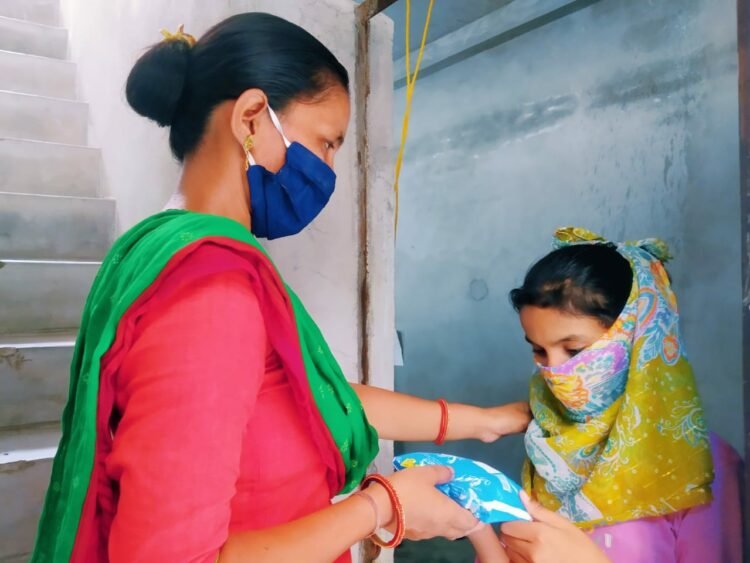While menstruation is a normal phenomenon, which is essential feature of a woman’s reproductive ability, yet girls and women in India go through extreme struggles to manage their menstruation cycle every month. A large chunk of the Indian population believes this natural cycle to be a ‘curse’, ‘impure’ and ‘dirty’ among other things, courtesy of the ancient myths surrounding menstruation in our country. India, a sub-continent with over 1,380,209,695 people as per July 6, 2020, has only 57.6% of women using sanitary napkins during their menses.
If this percentage wasn’t already a red flag about the rest of 42.4% of the women across the country resorting to unhygienic practices like using cloth, cotton, leaves, ash, or hay, the recent Corona lockdown created harsh circumstances for menstruating women. Use of Ashes and Muds for menstrual hygiene, washing reusable feminine products with soap and drying them in sunlight may be difficult due to lack of water, private facilities, and cultural taboos associated with menstruation can increase a woman’s chances of contracting cervical cancer, Reproductive Tract Infections, Hepatitis B infection, various types of yeast infections and Urinary Tract Infection, to name a few.
The situation is worst in poor and marginalised segments. Poor menstrual hygiene practices not put the women at risk of various infections and diseases, but also hinder their day-to-day tasks. She loses her self-esteem and confidence and suffers in silence. Often adolescent girls drop out of school and education system due to this personal problem.
In times of Covid pandemic, where health and hygiene is of utmost importance, lack of menstrual hygiene is only aggravating their risk to infection. State-run schools distributing sanitary napkins to the girls and promoting menstrual hygiene are non-functional since March 2020, resulting in a shortage of pads amongst less fortunate families in rural and urban areas.

AROH on personal level took the initiative of sanitary napkin distribution to women in need. As a ray of hope, these initiatives took a decent leap by distributing over 1000 reusable sanitary napkins in Delhi slums and villages across Delhi NCR. Along with the distribution of the pads, AROH conducted extensive online webinars and Facebook Live sessions to connect with the last mile houses in the villages and make them aware about safe menstruating practices. Experts were roped in, projectors were used and local ANMs were engaged to achieve the mission of “Period Freedom” – effort for Promoting Freedom of Women from Period Pain and Shame.
Dr Neelam Gupta, president of AROH Foundation recalls how helpless the women had become during COVID-19 and how the personal hygiene had taken a back seat. She says, “While me and my team were on the ground, trying to facilitate essential supplies people in need, I met Rohini (name changed) a resident of Sangam Vihar slums of South Delhi. She said, “We don’t even have enough to afford two square meal for our family of 5, how can then I ask my husband for sanitary napkins? Both my two daughters and I have managed to survive our cycles while using old clothes. I know it can affect our health but then what can I do?” Dr Gupta further says, “Rohini wasn’t alone. Hundreds of women in the urban slums of Delhi were in a similar situation and things may be worse than what they appear as such issues are not discussed openly. They already were struggling to survive in lockdown as the pandemic had already taken their sources of income. At a time when personal hygiene is of utmost importance, the need for hygienic means for women to manage their periods is all the more crucial. The plight of migrant workers, who had to walk all the way from one state to another to reach their hometown were facing the worst fight. Many of them were women workers, who not only had to deal with the issue of food and water shortage during the excruciating hot weather conditions but to walk hundreds of kilometers on foot while menstruating and lack of any said napkins.”
“With production also becoming constrained, availability of menstrual hygiene products including disposable and reusable sanitary pads at the last mile rural retail points was most affected. Consumers who could access the products at block or district level markets were unable to do so due to lack of public transport and mobility restrictions under the lockdown. Various State and district governments have school-based distribution of sanitary pads. With schools closing down, many such girls and their female family members had no access to sanitary pads. This has forced many girls and women to shift from disposable sanitary pads to cloth pads.
Adding to the scuffle, initially sanitary napkins were not even considered to be an essential item, their production stopped during the Covid-19 crisis, breaking the supply chain of pads across the country. However, the government later on added these to the essentials list, but the supply was slow and insufficient. Also to enlighten everyone, Cloth pads can be a hygienic means of managing menstruation, if accompanied with information and facilities for hygienic management. Addressing the elephant in the room, it is high time that we, on our personal level, step up to end this taboo of menstruation in the country. With more and more awareness that we spread, we need to address both the genders so that we make them comfortable and accept menstruation as a naturally occurring healthy phenomenon, instead of some shameful and impure occurrence that makes women untouchable for the time being. Further, we need to take the initiative of making sure that women coming from less fortunate families have access to sanitary napkins, while the state-run schools come back in action after the pandemic is taken care of. On a personal level, we can personally distribute napkins, start or grow the campaign for the same. With a small effort, we will be saving countless lives on a country-wide level.” Dr Gupta suggested.




























